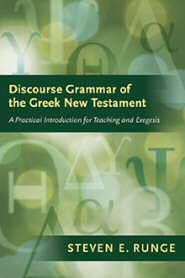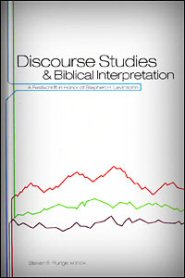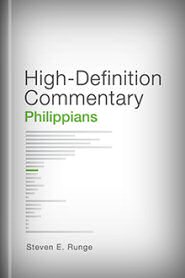Greek New Testament Discourse Bundle (9 vols.)
Digital Logos Edition
For the most up to date collection of discourse on the Greek of the New Testament, check out the Lexham Discourse Greek New Testament Datasets (4 vols.).
Overview
The Greek New Testament Discourse Bundle (9 vols.), a compilation of works by Greek scholar Steven Runge, is designed to give the reader a mastery of the original New Testament text. Whether you are beginning to study Greek or are a seasoned seminary student, this nine-volume bundle will give you fresh insight on the usage of Greek in the Bible.
- Expositional commentaries based on discourse analysis
- Chapters include introductions, conclusions, and bibliographies
- View the Greek and English side-by-side
Steven Runge has made a valuable contribution to the revolution [in discourse linguistics] by his insightful analysis of each New Testament book in his Lexham Discourse Greek New Testament. Now he has taken the next step and provided a theoretical base for his applications in Discourse Grammar of the Greek New Testament. . . . I commend his pioneering work for serious consideration by all New Testament students and scholars. . . . I have always been interested in any type of analysis that will help me understand the New Testament better. Discourse Grammar of the Greek New Testament has helped me to do just that.
—Dr. William Varner, Professor of Greek Exegesis, The Masters College
- Title: Greek New Testament Discourse Bundle
- Publisher: Lexham Press
- Volumes: 9

Lexham Discourse Greek New Testament Bundle (6 vols.)
- Author: Steven Runge
- Publication Date: 2008
Our understanding of the Greek New Testament is based almost entirely on English translations, but how would our understanding of the Greek text change if we read it for what it is—as Greek? With the Lexham Discourse Greek New Testament, we can now get behind the words of the New Testament writers and discover the particular linguistic tasks that inform translation and interpretation. The Lexham Discourse Greek New Testament identifies discourse markers and performs complex discourse analysis of the entire New Testament quickly, easily, and accurately, which makes it one of the most advanced tools for studying the Greek text of the New Testament.
The Lexham Discourse Greek New Testament includes the entire Greek text of the New Testament marked up with more than twenty discourse devices, making discourse analysis easier than ever! The Lexham Discourse Greek New Testament comes with a general introduction to discourse grammar, where you’ll find an overview of each discourse device and numerous examples from the Greek text of how various New Testament authors used these devices to communicate. The Lexham Discourse Greek New Testament also includes a built-in, easy-to-use glossary. By simply hovering over a discourse device, the glossary appears, allowing you to quickly access information about the device and about the text you’re looking at. With the Lexham Discourse Greek New Testament, it’s also possible to search for all instances of a particular device, such as all cataphoric references in 1 John or all temporal frames in the Gospels. The search tool aids in discourse analysis of entire books—textual analysis that once took hours can now be done with a click of a mouse! The Lexham Discourse Greek New Testament makes this all possible.
The Lexham Discourse Greek New Testament requires an unlocked copy of the English Standard Version, which is included in all of our base packages.
Titles Included
- Lexham Discourse Greek New Testament
- Lexham Discourse Greek New Testament: Glossary
- Lexham Discourse Greek New Testament: Introduction
- Lexham High Definition New Testament: ESV Edition
- Lexham High Definition New Testament: Glossary
- Lexham High Definition New Testament: Introduction

Discourse Grammar of the Greek New Testament: A Practical Introduction for Teaching and Exegesis
- Author: Steven Runge
- Publisher: Lexham Press
- Publication Date: 2008
The Discourse Grammar of the Greek New Testament revolutionized how we read the New Testament by applying discourse markers to the Greek text. Now, Steven Runge's Discourse Grammar of the Greek New Testament: A Practical Introduction for Teaching and Exegesis offers readers a book-length treatment of discourse linguistics and how it can be applied to New Testament exegesis and interpretation. In Discourse Grammar of the Greek New Testament, Steven Runge introduces a function-based approach to language, and seeks to describe grammatical conventions based upon the discourse functions they accomplish. This volume does not reinvent previous grammars or supplant previous work on the New Testament. Instead, Runge reviews, clarifies, and provides a unified description of each of the discourse features. That makes it useful for beginning Greek students, pastors, and teachers, as well as for advanced New Testament scholars looking for a volume which synthesizes the varied sub-disciplines of New Testament discourse analysis.
The approach in Discourse Grammar of the Greek New Testament is cross-linguistic. Runge looks at how all languages operate before he focuses on Greek. He examines linguistics in general to simplify the analytical process and explain how and why we communicate as we do, leading to a more accurate description of the Greek text. The approach is also function-based—meaning that Runge gives primary attention to describing the tasks accomplished by each discourse feature.

Discourse Studies and Biblical Interpretation: A Festschrift in Honor of Stephen H. Levinsohn
- Editor: Steven Runge
- Publication Date: 2011
- Pages: 412
Stephen H. Levinsohn is by no means the only SIL International member deserving recognition for significant contributions to the field of biblical studies; all too frequently such work goes unrecognized, even if it is appreciated in some quarters. The goal of this volume is to see that at least in Stephen's case, his work receives the commendation that it deserves. Each of the contributors to this volume has had their ideas challenged or influenced by Levinsohn's work, and each counts it an honor to contribute to a volume honoring him. The caliber of these scholars should dispel any doubts about why we're honoring Stephen's work in this Festschrift; the list of contributors speaks for itself. If you have been wondering exactly what discourse studies has to offer to biblical interpretation, of the dividends that are in store for those who invest the time and effort to enter this field.
Contents
- "Discourse Analysis as an Aid to Bible Translation" by Iver Larsen
- "Why Hasn't Literary Stylistics Caught on in New Testament Studies?" by Stanley E. Porter
- "Let Me Direct Your Attention: Attention Management and Translation" by Robert A. Dooley
- "How Orality Affects the Use of Pragmatic Particles, and How It Is Relevant for Translation" by Regina Blass
- "Organization and Allusion in Ezekiel 20" by R. J. Sim
- "Breaking Perfect Rules: The Traditional Understanding of the Greek Perfect" by Constantine R. Campbell
- "Greek Presents, Imperfects, and Aorists in the Synoptic Gospels: Their Contribution to Narrative Structuring" by Buist Fanning
- "The Verbal Aspect of the Historical Present Indicative in Narrative" by Steven E. Runge
- "Particles and Participles: A Helpful Partnership" by Margaret G. Sim
- "The Semantic Effect of Floating Quantifiers in New Testament Greek" by Lindsay J. Whaley
- "The Discourse Function of ἀλλά in Non-Negative Contexts" by Rick Brannan
- "Information Structure Issues in Copular εἶναι Clauses" by Nicholas A. Bailey
- "Evaluating Luke's Unnatural Greek: A Look at His Connectives" by Randall Buth
- "The Use of the Article Before Names of Places: Patterns of Use in the Book of Acts" by Jenny Read-Heimerdinger

High Definition Commentary: Philippians
- Author: Steven Runge
- Publication Date: 2011
Logos Bible Software is presenting another first in cutting-edge resources for teachers and pastors! This study in Philippians inaugurates a brand-new series by Logos, the High Definition Commentary. Not only does it provide discourse-based commentary, but also features custom-designed slides to use in your teaching. Each piece of artwork is tailored to illustrate the key ideas of the passage. Dr. Steven Runge, author of Discourse Grammar of the Greek New Testament highlights what you need to know to teach effectively from this book of the New Testament.
This commentary draws on the insights provided in the Lexham Discourse Greek New Testament (6 Vols.), helping you identify the Apostle Paul's intent by examining the linguistic and literary clues in the text. The High Definition Commentary: Philippians is a one-of-a-kind Bible teaching tool, and only available from Logos Bible Software.
Divided into preachable chunks, Philippians features clear and concise big ideas of the passage, as well as custom-designed graphics that you can export directly for sermons or Bible studies. Dr. Runge applies his linguistic and exegetical expertise to guide your study and examines the flow of the book. A highly approachable and illustrative work, this expository commentary also uses real-life examples and stories.
More volumes will be added based on interest in the project. If you like what you see, tell your friends!
Steven Runge has a Master of Theological Studies degree in Biblical Languages from Trinity Western Seminary in Langley, B.C., Canada, a B. A. in Speech Communication from Western Washington University, and a Doctor of Literature degree in Biblical Languages from the University of Stellenbosch in South Africa, which was supervised by Christo Van der Merwe. In preparation for his doctoral research, Steven completed several years of study in the linguistic fields of pragmatics and discourse grammar. He has served as an adjunct faculty member at Northwest Baptist Theological College, Trinity Western University, and Associated Canadian Theological Schools (ACTS) while completing his education. He presently serves as a Scholar-in-Residence at Logos Bible Software.
Reviews
27 ratings
Peter
6/9/2018

Charles
9/28/2017

DavePL HI Haoli KI
1/13/2017
Tim Limkeman
12/23/2016
Henry Lara
5/21/2016

Robert Christian
2/19/2016

Adam Olean
2/5/2016
Mateusz Krzesiński
11/3/2015
Donald W. Mills
6/8/2015
Robert Chavez
4/26/2015
After cursory use, my impression is that this resource is excellent for beginners and intermediate level acolytes. This resource may be elementary for advanced students.